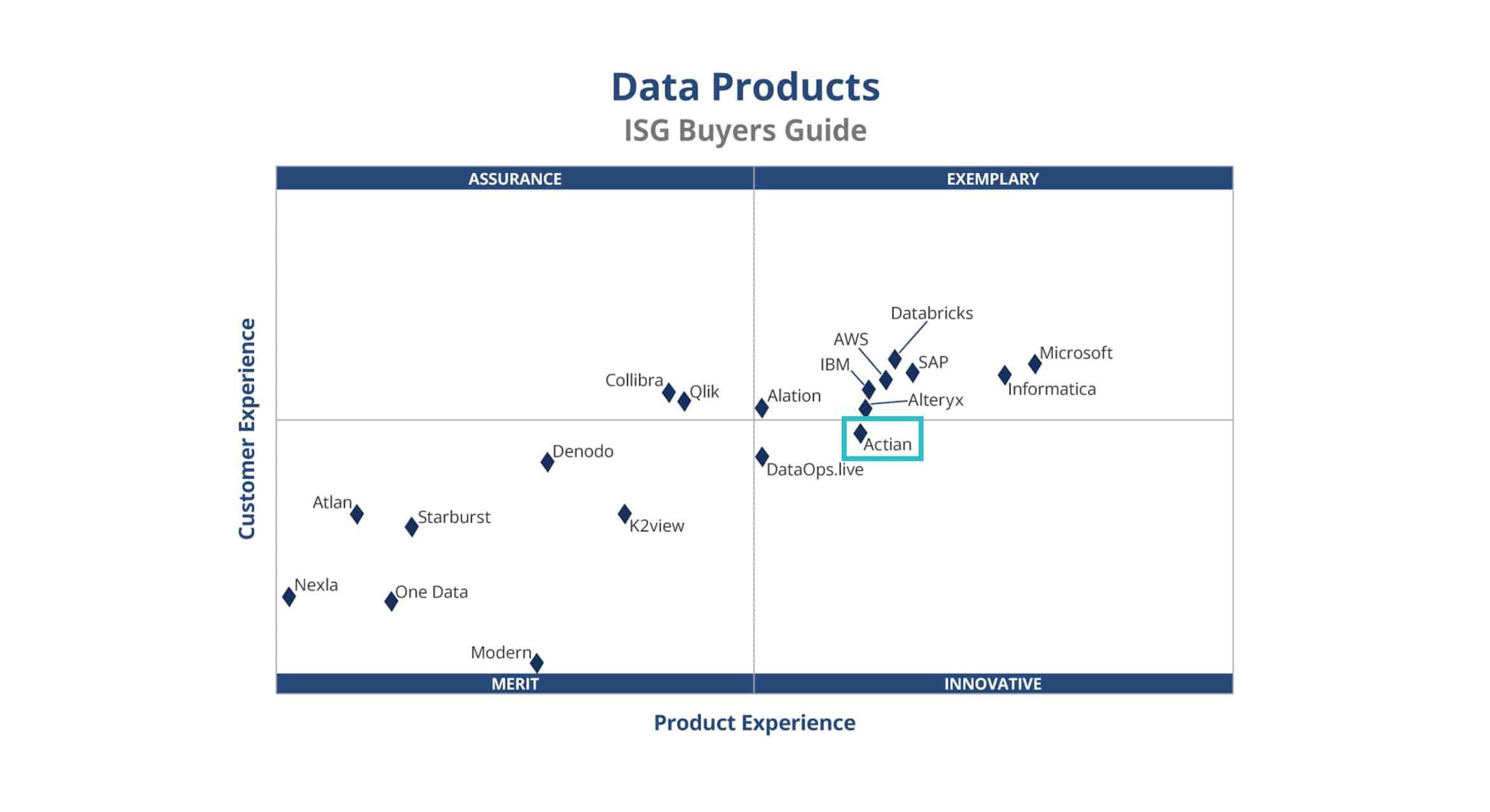Decentralize, Democratize, Differentiate: Embrace Data Products
Guillaume Bodet
January 16, 2025

The evolution of data management is being shaped by the decentralization of data ownership and the rise of new organizational needs. Traditional data management approaches—often centralized and cumbersome—are no longer sufficient to meet growing business demands for speed, accessibility, and quality.
Decentralization promotes accountability and ensures that data is managed by those with the deepest understanding of its context and relevance. These domains also are responsible for creating data products so the most valuable data assets can be shared and used across the organization.
ISG Research defines data products as “the outcome of data initiatives developed with product thinking and delivered as reusable data assets that can be discovered and consumed by others on a self-service basis, along with associated data contracts and feedback options.” They can be a domain specific data set, an algorithm, or a machine learning model.
Your company, like other modern organizations, requires ready-to-use data products that are easily accessible by analysts and business teams across the organization. Data products are expected to provide immediate value to both technical teams and data users in the business. The problem is that too often, data volumes are too vast to be useful—they overwhelm analysts and other data users.
That’s why data products should leverage metadata—the data about your data—because the value of data is activated when metadata is captured and utilized. In practice, an operational data product consists of both data and metadata, and the latter ensures that consumers have all the information they need to use the product. Tools that utilize metadata allow you to quickly find, understand, and manage data products via an internal data marketplace to unlock new business value and drive outcomes faster. Importantly, data products must allow users in your organization to access and use the data they need without barriers such as requiring specialized skills or IT help.
How to Choose the Right Solution
For data product platforms to succeed, they must be designed with usability and product experience in mind. Business leaders, analysts, and developers often have diverse skillsets and needs, making intuitive interfaces and data integration key factors. Additional factors to consider include self-service functionality that minimizes reliance on IT teams; clear documentation and data lineage to build trust and transparency; and feedback mechanisms to continuously refine and improve data quality.
Data products should excel in being:
- Cleansed, transformed, high quality, and ready for analysis.
- Accessible: Barrier-free access to data users and others who need it.
- Datasets and data elements are seamlessly unified into a single, trusted unit, enabling effortless distribution.
- Searchable and understandable. Metadata-driven and domain-centric so the data products are easy to find and understand.
- Composed of one or more data assets that work together for rich data insights.
- Reusable: Built from composable elements that can be leveraged to create multiple data products, including derivatives.
When data products are easy to use and have the capabilities you need, they enable you and your teams to innovate, collaborate, and make decisions with confidence—qualities that drive business growth.
The Business Case for Decentralizing Data Ownership
Decentralization of data is a concept supported by a data mesh architecture, which promotes the democratization of data across a business. Unlike centralized data warehouses, a decentralized approach, as highlighted in this practical guide to data mesh, federates data and delegates data ownership to specific business domains.
With businesses adopting decentralized models, the demand for advanced metadata solutions that enable data discovery is only expected to grow. According to the ISG Buyers Guide™ for Data Products, by 2027, more than 60% of enterprises are projected to adopt technologies that facilitate the delivery of data as a product as cultural and organizational approaches to data ownership, in the context of data mesh, evolve.
The move to decentralized data ownership requires a new focus on metadata management, which is where the right product can help. For example, a data discovery platform organizes metadata, providing a unified view of data assets across the organization. In addition, an internal data marketplace enables users to consume the data for other uses.
Treating data like a product that can be packaged, discovered, and consumed by others across your organization helps you achieve:
- Quickly find the data you need.
- Ensure that data from different domains works together seamlessly.
- Maintain compliance and quality standards across your organization.
Gaining Trusted Insights into Data Products
It’s not surprising that many technology buyers and users have a lot of questions about the value, usability, capabilities, limitations, and return on investment of data products. A LinkedIn post from Ehtisham Zaidi, Gartner VP Analyst and Key Initiative Leader, Data Management, says that his team has fielded more than 500 inquiries about data products.
He notes that most organizations are not defining data products correctly, with some believing that any integrated dataset is a product. He says that most organizations also struggle with understanding and enabling core data components, such as data governance and management. As a result, organizations have questions about operationalizing and sharing data using a data marketplace.
As your business requirements evolve, new use cases for data arise, and you move toward a decentralized approach, understanding which data solutions meet your needs is increasingly important. You also need to know which solutions can address common challenges such as fragmented data, inefficient workflows, and a lack of confidence in data quality.
Resolving these issues requires implementing modern technology. As noted in the ISG Buyers Guide for Data Products, look for solutions that apply “product thinking” to data initiatives, treating data as reusable, shareable, and consumable assets. This approach helps you:
- Streamline Access to Data. Easily discover and use data on a self-service basis using an enterprise data marketplace.
- Enhance Data Confidence. Ensure the reliability and discoverability of data by leveraging metadata.
- Accelerate Time-to-Value. Deliver actionable insights faster by leveraging easy-to-access, high-quality data.
Selecting the ideal data solution requires careful evaluation. The ISG Buyers Guide for Data Products, like the ISG Buyers Guide for Data Platforms, is a trusted, third-party resource for organizations looking to navigate this complex product landscape. The guide evaluates leading software providers, offering insights into usability, manageability, customer experience, and other critical factors.
For insights into choosing the right products for your business, download your complimentary copy of the ISG Buyers Guide for Data Products. It evaluates 19 vendors based on a comprehensive set of criteria in various categories including product experience, capabilities, reliability, customer experience, return on investment, and more.
The guide explains how innovative solutions like the Actian Zeenea Data Intelligence Platform are transforming the way companies manage, democratize, and consume data. The guide positions the Actian Zeenea platform as Innovative and a Leader in Manageability with strong performance in Customer Experience. If you’re looking to modernize, decentralize data, or implement data products, this essential guide can help inform your buying decision.
As the push to decentralize data continues, businesses like yours must adopt modern approaches to stay competitive. By investing in user-friendly, value-driven data products and an e-commerce-like internal data marketplace, you can harness the full potential of your data, enabling faster insights and confident decision-making.
Subscribe to the Actian Blog
Subscribe to Actian’s blog to get data insights delivered right to you.
- Stay in the know – Get the latest in data analytics pushed directly to your inbox.
- Never miss a post – You’ll receive automatic email updates to let you know when new posts are live.
- It’s all up to you – Change your delivery preferences to suit your needs.
